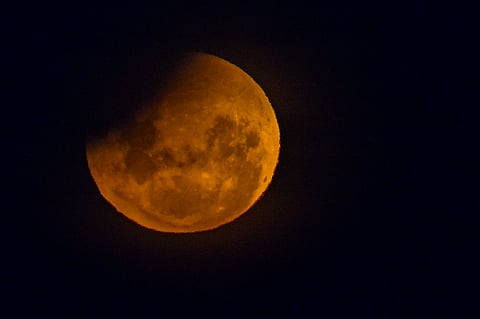Lunar Eclipse 2025 myths: The science behind blood moon superstitions
Here’s what science says about blood moon food, health, and pregnancy myths

Dubai: Billions of people, including those in the UAE and Saudi Arabia, will witness this year’s second-to-last lunar eclipse on September 7 — a rare total event set to light up skies across the Arab and Islamic world.
While the spectacle promises a striking red-hued moon, it also carries centuries of myths. From claims that food becomes unsafe to warnings for pregnant women or fears of bad luck, science confirms these beliefs hold no ground — the eclipse is simply a breathtaking natural alignment of the Earth, Sun, and Moon.
Astronomers note that this will be among the longest lunar eclipses in recent years, unfolding in distinct phases before reaching its peak.
Blood moon over the UAE
Residents in the UAE can look forward to a dramatic sight as the moon transforms into a deep crimson ‘Blood Moon’ from the night of September 7 into the early hours of September 8. Stargazers will be treated to a mesmerising show as the Earth’s shadow casts a reddish hue across the lunar surface.
Eclipses and myths through history
Although science explains eclipses as the alignment of the Earth, Sun, and Moon, they have long been surrounded by folklore and superstition. Across cultures, lunar eclipses were viewed as omens of danger, change, or divine intervention:
India: Families traditionally stay indoors, avoid cooking, or refrain from using sharp objects.
Aboriginal Australian traditions: Considered ominous, linked to disease or imbalance.
Ancient Egypt: The eclipse was imagined as a sow devouring the Moon.
Chinese mythology: A dragon was believed to be biting the Moon.
Popular myths about lunar eclipses
Pregnancy myths: Some believe expectant mothers should avoid stepping outdoors, fearing scars or birthmarks on the baby. Science confirms a child’s physical traits are determined by DNA and development — not eclipses.
Food myths: Many avoid cooking or eating, believing food becomes unsafe. In reality, eclipses have no effect on food safety.
Eye safety: Unlike solar eclipses, lunar eclipses are completely safe to watch with the naked eye.
Nature myths: Some say plants, water, or animals behave strangely. Science finds no evidence of harmful effects — unusual animal behaviour is anecdotal.
Disaster myths: Eclipses are often linked to earthquakes, floods, or bad luck. Astronomers confirm these celestial events have no connection to natural disasters.
Debunking health and food superstitions
Eating and cooking – No scientific evidence shows food becomes “poisonous” during an eclipse.
Exercise – Safe to work out; accidents are unrelated to eclipses.
Mental health – No direct link to anxiety, sadness, or mood changes.
Fasting and rituals – These practices hold cultural and religious meaning but lack scientific support.
Frequently asked questions
1. Do lunar eclipses contaminate food or water?
No. Science confirms food and water remain unaffected.
2. Can we eat meat during the eclipse?
Yes. There’s no evidence linking eclipses with food safety.
3. Does a lunar eclipse have side effects?
No. A lunar eclipse does not impact human health.
4. What should we avoid during a lunar eclipse?
Nothing — except missing the chance to see it. The blood moon phase, when the Moon glows red, is safe and unforgettable.
The bottom line
A lunar eclipse is simply the Earth’s shadow falling on the Moon. It is one of the most striking spectacles in the night sky — and completely safe. For families in the UAE and beyond, September 7 is a chance to step outside, look up, and enjoy the Moon turning red: a natural wonder to be admired, not feared.





